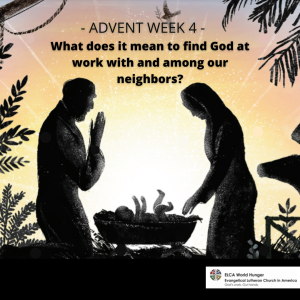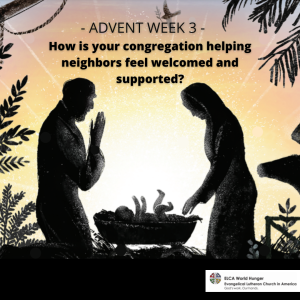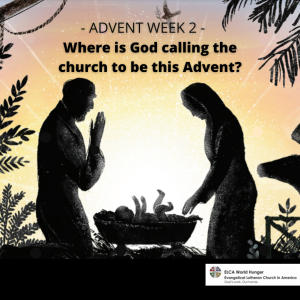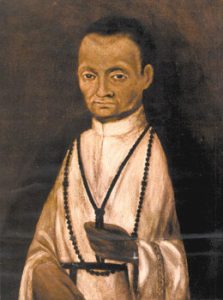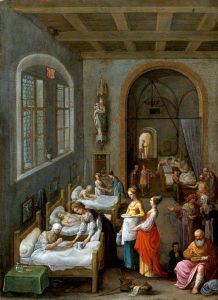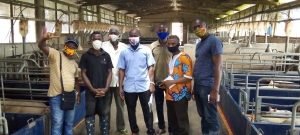ELCA World Hunger’s 40 Days of Giving
Lent 2022
In English and en Espanol
Week 2: Wandering in the Wilderness
“I must be on my way” (Luke 13:33).
Read
- Genesis 15:1-12;17-18
- Psalm 27
- Philippians 3:17-4:1
- Luke 12:31-35
Reflect
As we saw in the reflection for Week 1, Lent is a story of the journey of God’s people. It is our story, or more appropriately the story of “God with us.” During Lent, we remember the ancient Hebrews’ journey from slavery in Egypt and a generation spent wandering in the wilderness, as recounted in the offering of the “first fruits” in Deuteronomy. We also reenact, in our own small ways, Jesus’ journey into the wilderness as it was described in the Gospel of Luke in the first week of Lent. The fast that many Christians commit to during Lent reflects Jesus’ own fast in the wilderness.
In this sacred season, we turn inward, reflecting on our dependence on God’s grace. Marked by ashes at the start, we enter the 40 days of Lent with penitent hearts and awareness of our need for God’s mercy. Repentance and self-reflection are important practices, but it’s easy to stay here, forgetting that the season is about so much more than our own self-examination.
Martin Luther captured this well. Luther defined repentance in two ways: “contrition…and in taking hold of the promise.” Certainly, confession of the many ways we have fallen short is a key part of the spiritual practice of Lent. But the season of Lent also leads us to turn outward, as Luther wrote, “taking hold of the promise” of God as we both yearn for and proclaim Jesus’ words that define his time in the wilderness: “The Spirit of the Lord is upon me, because [the Lord] has anointed me to bring good news to the poor … [and] to proclaim the year of the Lord’s favor” (Luke 4:18-19).
The promise of good news is the gift of grace through faith in Jesus Christ, a promise of new life in the fullness of God’s reign. It is the promise of the Gospels and the prophets, the promise clung to by our ancestors in faith and the promise that sustains the people of God today in communities
around the world who accompany one another amid staggering challenges
of poverty, hunger and injustice.
Jesus not only proclaims the promise but lives it. He shows us what it means to live according to the promise — boldly, courageously, and with faith unceasing — from Galilee to Calvary. In the face of religious and political persecution, Jesus lives the daring life of faith in God’s grace.
While his trial before Pilate gets more attention, Jesus’ unrelenting march toward Jerusalem is one of the clearest examples of how to “take hold of the promise.” He travels from town to town, “teaching as he made his way to Jerusalem” (Luke 13:22). At one stop, a group of Pharisees warns him that he
must flee because Herod wants to kill him. Jesus responds: “Go and tell that fox for me, ‘Listen, I am casting out demons and performing cures today and tomorrow, and on the third day I finish my work’” (Luke 13:31-32).
Herod is coming for him, and Jesus responds, “I have work to do.” Jesus demonstrates a daring confidence that not even death can stop the work of God in the world. People of faith bring Jesus’ daring, grace-formed confidence to the calling of the church: seeing — even amid the threat of death — that there is work to be done.
In Indonesia, the threat from HIV and AIDS is very real. The island country is currently experiencing one of the fastest-growing HIV epidemics in the world. In 2018 (the most recent year for which data are available), 38,000 people died from an AIDS-related illness, an increase of 60% from 2010. The World Health Organization (WHO) estimates that 640,000 people in the country were living with HIV as of 2018, but WHO estimates that only about half of people infected with HIV are aware that they have it.
The Batak Christian Protestant Church (HKBP), a companion church of the ELCA in Indonesia, is helping people throughout the country confront the deathly disease with courage, hope and the resources they need to survive. Arjen first came to HKBP’s AIDS Ministry (HAM) when he was 12 years old, but he was born with HIV. By the time he came to HAM, he had contracted pulmonary tuberculosis and was malnourished and very sick. His father passed away, and Arjen’s mother couldn’t afford the cost of transportation to the nearest hospital or the expensive treatments for her son. With the help of HKBP, the family was able to have Arjen evaluated at a hospital and to start him on antiretroviral medication to keep him healthy. HAM workers regularly check in on the family, helping Arjen’s mother meet his nutritional and medical needs. Seeing the mother’s financial situation, HAM also provided a revolving fund for business capital that has allowed her to secure a more stable income to support her family.
A year into Arjen’s work with HAM, his health is improving and his mother’s business is growing. Amid poverty, hunger and a deadly epidemic, God is at work through families such as Arjen’s to bring about a future with hope. In Lent, we remember Jesus’ long walk to Jerusalem and to Calvary. And in faith, we know that nothing can stop the work of God. Together we “take hold of the promise” with confidence, knowing that, even out of death, God will bring new life and hope to the world.
Herod wants us dead? “I am casting out demons and performing cures” (Luke 13:32).
The shadow of the cross looms ahead of us? “I must be on my way” (Luke 13:33).
Poverty, hunger and disease threaten our community? Go and tell that fox that God isn’t done with us yet.
Ask
- Think of a time when fear impacted your ministry. How does Christ encourage us to venture outside our comfort zone to love and serve our neighbors?
- What does it mean for you and your congregation to “take hold of the promise” in your community?
- How can programs such as the HKBP AIDS Ministry (HAM) help us learn about what it means to be the people of God in the world? What does Arjen’s story mean for your own ministry and life?
- In the face of death, disease and poverty, God continues to bring new life and hope. How do you, your family and your congregation bear witness to courage and hope in an uncertain world?
Pray
Gracious God, amid the challenges our world faces, you remind us of your promise for the future of our world. Draw near to us and draw us near to our neighbors, that we may be inspired with hope, courage and audacious faith to be the people you are calling us to be. Be present with our companions and partners around the world as we work together toward a just world where all are fed. In your holy name, amen.
SEMANA 2: Vagando por el desierto
“Tengo que seguir adelante” (Lucas 13:33).
Lecturas: Génesis 15:1-12, 17-18; Salmo 27; Filipenses 3:17-4:1; Lucas 12:31-35
Como vimos en la reflexión de la Semana 1, la Cuaresma es una historia de la jornada del pueblo de Dios. Es nuestra historia o, más apropiadamente, la historia de “Dios con nosotros”. Durante la Cuaresma recordamos la jornada de los antiguos hebreos desde la esclavitud en Egipto y una generación que pasó vagando por el desierto, como se relata en la ofrenda de las “primicias” en Deuteronomio. También recreamos, en nuestra propia y modesta medida, el viaje de Jesús al desierto según fue descrito en el Evangelio de Lucas en la primera semana de Cuaresma. El ayuno al que muchos cristianos se comprometen durante la Cuaresma refleja el propio ayuno de Jesús en el desierto.
En esta temporada sagrada, nos concentramos en nosotros mismos, y reflexionamos en nuestra dependencia de la gracia de Dios. Marcados por las cenizas al inicio, entramos en los 40 días de Cuaresma con corazones penitentes y conciencia de nuestra necesidad de la misericordia de Dios. El arrepentimiento y la autorreflexión son prácticas importantes, pero es fácil quedarse aquí y olvidar que la temporada es mucho más que nuestro propio examen de conciencia.
Martín Lutero registró esto bien. Lutero definió el arrepentimiento de dos maneras: “contrición… y en apoderarse de la promesa”. Ciertamente, la confesión de las muchas formas en que nos hemos quedado cortos es una parte clave de la práctica espiritual de la Cuaresma. Pero el tiempo de Cuaresma también nos lleva a voltearnos hacia afuera, como escribió Lutero, “apoderándonos de la promesa” de Dios mientras anhelamos y proclamamos las palabras de Jesús que definen su tiempo en el desierto: “El Espíritu del Señor está sobre mí, por cuanto [el Señor] me ha ungido para anunciar buenas nuevas a los pobres… [y] a pregonar el año del favor del Señor” (Lucas 4:18-19).
La promesa de buenas nuevas es el don de la gracia a través de la fe en Jesucristo, una promesa de nueva vida en la plenitud del reino de Dios. Es la promesa de los Evangelios y los profetas, la promesa a la que se aferran nuestros antepasados en la fe y la promesa que sostiene al pueblo de Dios hoy en las comunidades de todo el mundo que se acompañan mutuamente en medio de abrumadores desafíos de pobreza, hambre e injusticia.
Jesús no solamente proclama la promesa, sino que también la vive. Nos muestra lo que significa vivir de acuerdo con la promesa —con firmeza, valentía y fe incesante— desde Galilea hasta el Calvario. Frente a la persecución religiosa y política, Jesús vive la valiente vida de fe en la gracia de Dios.
Aunque su juicio ante Pilato recibe más atención, la marcha decidida de Jesús hacia Jerusalén es uno de los ejemplos más claros de cómo “apoderarse de la promesa”. “Continuando su viaje a Jerusalén, Jesús enseñaba en los pueblos y aldeas por donde pasaba” (Lucas 13:22). En una de sus paradas, un grupo de fariseos le advierte que debe huir porque Herodes quiere matarlo. Jesús contesta: “—Vayan y díganle a ese zorro: ‘Mira, hoy y mañana seguiré expulsando demonios y sanando a la gente, y al tercer día terminaré lo que debo hacer’” (Lucas 13:31-32).
Herodes viene por él, y Jesús responde: “Tengo trabajo que hacer”. Jesús demuestra una audaz confianza en que ni siquiera la muerte puede detener la obra de Dios en el mundo. Las personas de fe llevan la confianza de Jesús, audaz y producto de la gracia, al llamado de la iglesia: ven — incluso ante la amenaza de muerte— que hay trabajo que hacer.
En Indonesia, la amenaza del VIH y el SIDA es muy real. El país insular experimenta actualmente una de las epidemias de VIH de más rápido crecimiento en el mundo. En 2018 (el año más reciente del que hay datos disponibles), 38,000 personas murieron de una enfermedad relacionada con el SIDA, un aumento del 60% desde 2010. La Organización Mundial de la Salud (OMS) estima que para 2018, 640,000 personas en el país vivían con el VIH, pero estima también que solo alrededor de la mitad de las personas infectadas con el VIH saben que lo tienen.
La Iglesia Protestante Cristiana de Batak (HKBP), una iglesia compañera de la ELCA en Indonesia, está ayudando a las personas de todo el país a enfrentar la enfermedad mortal con valor, esperanza y los recursos que necesitan para sobrevivir.
Arjen llegó por primera vez al Ministerio de SIDA (HAM) de HKBP cuando tenía 12 años, pero había nacido con VIH. Cuando llegó a HAM había contraído tuberculosis pulmonar y estaba desnutrido y muy enfermo. El padre de Arjen había fallecido, y su madre no podía pagar el costo del transporte al hospital más cercano ni los costosos tratamientos para su hijo. Con la ayuda de HKBP, la familia pudo llevar a Arjen para que lo evaluaran en un hospital y comenzara a tomar medicamentos antirretrovirales para mantenerlo saludable. Los trabajadores de HAM verifican regularmente con la familia el estado de Arjen, y ayudan a su madre a satisfacer las necesidades nutricionales y médicas de él. Al ver la situación financiera de la madre, HAM también proporcionó un fondo rotatorio para capital empresarial que le ha permitido asegurar un ingreso más estable para mantener a su familia.
Un año después del trabajo de Arjen con HAM, su salud está mejorando y el negocio de su madre está creciendo. En medio de la pobreza, el hambre y una epidemia mortal, Dios está trabajando a través de familias como la de Arjen para lograr un futuro con esperanza.
En la Cuaresma recordamos el largo camino de Jesús a Jerusalén y al Calvario. Y en fe sabemos que nada puede detener la obra de Dios. Juntos “nos apoderamos de la promesa” con confianza, sabiendo que Dios traerá nueva vida y esperanza al mundo, incluso de la muerte.
¿Herodes nos quiere muertos? “Estoy expulsando demonios y sanando a la gente” (Lucas 13:32).
¿La sombra de la cruz se cierne sobre nosotros? “Tengo que seguir adelante” (Lucas 13:33).
¿La pobreza, el hambre y las enfermedades amenazan a nuestra comunidad? Ve y dile a ese zorro que Dios aún no ha terminado con nosotros.
Preguntas para la reflexión
- Piense en un momento en que el miedo afectó su ministerio. ¿Cómo nos anima Cristo a aventurarnos fuera de nuestra zona de confort para amar y servir a nuestro prójimo?
- ¿Qué significa para usted y su congregación “apoderarse de la promesa” en su comunidad?
- ¿Cómo ayudan programas como el Ministerio de SIDA de HKBP (HAM) a que aprendamos sobre lo que significa ser el pueblo de Dios en el mundo? ¿Qué significa la historia de Arjen para su propio ministerio y su vida?
- Ante la muerte, la enfermedad y la pobreza, Dios sigue trayendo nueva vida y esperanza. ¿Cómo usted, su familia y su congregación dan testimonio de valentía y esperanza en un mundo incierto?
Oración
Dios misericordioso, en medio de los desafíos que enfrenta nuestro mundo, nos recuerdas tu promesa para el futuro de este. Acércate a nosotros y acércanos a nuestro prójimo, para que podamos ser inspirados con esperanza, valor y una fe firme para que seamos las personas que nos estás llamando a ser. Está presente con nuestros compañeros y socios en todo el mundo mientras trabajamos juntos por un mundo justo en el que todos sean alimentados. En tu santo nombre, amén.




